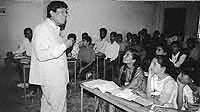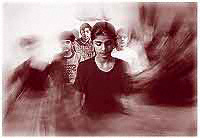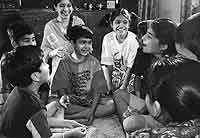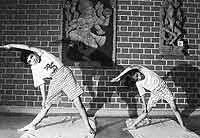- Home
- Archive -June 1998
- Learning to gro. . .

Learning to grow
- In :
- Personal Growth
June 1998
By Kumkum Bhandari
Personal growth courses may well provide today’s child the much-needed skills to grow into a creative, effective and balanced individual
MEDITATION FOR HOMEWORK
A two-week workshop of anapana meditation is annually held at Gitanjali School in Hyderabad, India. Anapana is the first stage of vipassana meditation, as taught by S.N. Goenka, and involves watching the breath. The course is held within the school, with batches of students spending two hours a day meditating. While meditating, the students sit cross-legged on the floor and, with their eyes closed, watch their breath as they inhale and exhale. They are joined in this exercise by the school staff.
 |
Vipassana counselors also explain the techniques of meditation to students through stories. Children clear their doubts in interactive sessions where their problems are discussed threadbare. The students are also given regular meditation ‘homework’ for five days. On the last day, they write their own impressions about the course.
Going by the reactions of the students, anapana meditation seems to be an ideal means for self-development. Tasleem Banu, a class nine student, finds meditation an effective tonic to improve her concentration. Anapana has also given Siddharta Subramanian of class eight a boost in self-confidence.
 |
Forget about neighborhood hobby classes, idle splashing in swimming pools, the recommended theater workshop or summer camp. The answer to ‘Honey, what shall we do with the kids this summer?’ can be found in the ads offering personal growth classes tailor-made for kids. Courses where your child could acquire a new perception of life, shed negativity, and overcome blocks in the path of a healthy body, mind and spirit. Time for an early lesson in life.
But, you ask, why would your child with his trusting, spontaneous, and no-limits approach to life need to be coached in the art of living? He’s doing fine, helped along by good old-fashioned parenting. Haven’t we stayed up nights, trimming their toenails, nudging their manners in place, and programming them to be achievers in a scarcity-driven world? We are competently raising 21st century kids.
Pause a while, say experts. Steve Biddulph writes in his best-selling parenting guide More Secrets of Happy Children: ‘Perhaps the more serious and insidious harm that has been done to children in the last 20 years, has been caused by the way we have taken away their childhood.’ He points an accusing finger at:
• the idiot box which ‘heaps our children with needless negativity’
• an over-programmed life where, apart from academic pressures, kids are shuffled from one hobby or sports class to another-leaving no space for the child to marvel at the wonders of creation
• the competitive rat-race where children are stressed out by a performance-oriented attitude right from kindergarten
• overworked, guilt-laden parents who try to compensate their absence by providing ‘more possessions and experiences’ which they have to work harder to pay for
• an unsafe, polluted, violent world, where children learn to substitute trust and openness with suspicion and reserve.
Beyond the challenges and chores of everyday parenting, there are more things in today’s child’s mind and heart than most parents could dream of or even have experienced in their own childhood. Biddulph suggests, ‘a re-greening of childhood, to conserve the rare, natural, wild part of our children’. Recommended, too, is a sampling of the latest New Age product: personal growth classes for children to equip them for 21st century survival. Classes where children learn that they are perfect in essence and are here to sharpen skills for achieving life’s goals. And that we will love them any which way they choose to be—even if we say that with fingers crossed!
The look-good exterior, aided by designer shoes and clothes—or slick imitations from pavement bazaars—hardly reflects the deep-rooted self-esteem problems that many of our children battle. Take Nikhil, 16, a student of St. Columbus School, New Delhi, India. A bright, creative and imaginative son of an overachieving businessman, he is fraught with intense anxiety and comments: ‘There are many faults in me.’ For many, failure to live up to set expectations in specific areas, has an all-pervasive effect—fostering a negative self-image. Personal growth experts caution that in such cases, timely intervention is essential.
Erehwon, an 11-year-old Mumbai-based organization in India, emphasizes that thinking properly presents one with a ‘package of alternatives’ that cut through self-limiting perceptual and emotional blocks. Working mainly through various schools, or camps that they are invited to conduct, the Erehwon thinking skills program (ETP) for youngsters uses games and exercises to expose them to processes that help in fields beyond academics. There are easy-learning techniques to trigger off ideas relating to any subject. Innovative exercises help children explore the pros and cons of a situation and examine personal biases that may prompt impulsive or ‘reactive’ behavior. The ‘magical’ points-of-view exercise helps children enter another’s mind, heart and shoes, generating tolerance for differing viewpoints. TOW (‘Think Other Ways’) opens creative options and builds confidence as each child glimpses his or her own limitless potential. Trained facilitators conduct this innovative program. This year, Erehwon’s summer camps include programs for children of corporate managers, many of whom have undergone ETP themselves.
Sensing the need, many people are creating their own personal growth courses for children. First-time entrants include Excel Training Forum and Sankalp, both run by retired defense personnel in Delhi, India.
 |
Says Brig. S.K. Gulati of Excel: ‘This 25-hour course will help actualize latent leadership qualities and generate self-awareness. It is an education for life. Apart from educated parents who enroll their children after long discussions, the students include small-town dwellers who wish to gear up for city living, and children from business families in search of finish and polish.’
For Air Commodore Tilak Raj Sharma, Sankalp is a way to bring values back into society. A natural extension of his hobby—his personal library has 800 books on personal growth—Sankalp workshops emphasize character building, assertiveness, creativity, communication skills, and career planning for older children.
HRD trainer Himani Arora’s Neev in New Delhi, India, offers a two-month certificate course crammed with activities. The focus is not just on acquiring skills, but also working at a deeper level of development. For instance, an exercise on values has Arora marking different corners of the room with the labels ‘sure’, ‘disagree’ and ‘uncertain’ and shooting statements such as: ‘Violence is justified for a cause’ or ‘Dating is fine’. Every participant has 30 seconds to go to his or her chosen corner. While one-to-one sessions might not yield quick results, children are carried along by the spirit of a peer group and readily, honestly, and even humorously confront what they stand for. At the same time, they have a chance to look at and examine alternative perceptions and ways of thinking. ‘Clarifying values,’ explains Arora, ‘helps redefine attitudes, and results in more effective behavior.’
An interesting option away from overprotective parents is the eight-day, activity-packed summer camp organized by Discovery Educational Services at its permanent campsite in the pine forests of Silakhet, Uttar Pradesh, India. The 22 hours scheduled with trained professionals help your child build skills in one ‘major’ activity such as archery, aero-modeling, photography or theater. Another 6-10 hours are scheduled for one ‘minor’ activity such as astronomy, magic, painting or public speaking. The camps help acquire skills while focusing on deeper self-development through solitary and team activities. These activities further analyze a child’s strengths and weaknesses and provide tips on developing independence.
Curious about how children perceive such programs, I drag my horrified preadolescent to an Art Excel class, run by the charismatic Indian guru Sri Sri Ravi Shankar’s Art of Living Foundation. First conducted in Rishikesh, India, on March 1997, the workshop is gaining rapid popularity.
Utter confusion prevails at the course venue, the basement of the Aparna Academy of Fine Arts, New Delhi, as solicitous parents, dull-looking ayahs and squabbling siblings jostle with young participants in the 8-14 age group. Finally, forms filled, the money deposited, and a jumble of designer shoes left by the door, the barefooted children settle down on hastily unrolled carpets.
Ground rules are laid out: no television, no chocolates, no complaints for the next six days which will include the all-important sudarshan kriya involving breathing, yogasanas, meditation, and self-awareness exercises, peppered with a lot of fun and games.
The group is divided into pairs for a ‘Who am I?’ exercise. An exchange of personal details takes place, following which recipients of the information are asked to share it with the rest of the group. Not surprisingly, they flounder while recalling. The lesson: be 100 per cent alive to the present moment, whether you listen to someone, play, eat or work. A fully lived present overcomes fears of the past or uncertainty about future results.
Next, all participants pop a grape in their mouths. After rolling the grape on their tongues for an interminably long time, they are allowed to sink their teeth slowly into it, savoring the taste and texture with eyes closed. A valuable lesson for a generation given to gobbling food on the run or in front of the TV.
Can we play some games, asks a restive eight-year-old as the instructor elaborates on abdominal breathing. Breathe deep, deep, as if you are smelling a rose or an aromatic dish.
The class finishes late. The drive home is laden with recriminations. Our ‘doing’ sons and daughters take time to slow down and absorb such information.
The next day my visibly less reluctant co-passenger comments on our way to the course venue that he topped the class quiz at school. Using the ‘be-in-the-present-moment’ approach, he could shoot off answers almost before the questions were phrased. Plus one, for increased concentration.
Over the next days, the children roller coaster through fast-changing and varied activities: from philosophical discussions and raucous games with inbuilt lessons to meditative mind-stilling exercises and laughter therapy. There are relaxation techniques, dance meditations, art therapy and grounding exercises. All this conclusively demonstrates to the children that they can be in control. It is empowerment at a very basic level.
Central to the workshop is the 20-minute sudarshan kriya. Its regular practice works on the physical, mental and emotional level, helping children clear toxins from the system, and experience total calm.
There are other experiences. Preys to the consumer culture, our children have almost forgotten the feeling of gratitude. In an attitude-of-gratitude exercise in the workshop, the children face east with closed eyes, hands meeting in a namaste, bowing and chanting ‘Om’ on cue from the instructor who softly intones:
We express our gratitude to Mother Earth
To everything that grows on it…
Now we will chant Om and bow to Mother Earth.
 |
The exercise continues with gratitude expressed to the sun, to one’s ancestors and to various body parts. As it ends, many children unselfconsciously wipe streaming eyes. Others express overwhelming feelings of happiness and gratitude, while some report sensations of strong energy vibrations on their head, shoulders arms and palms. It has been a moving and novel experience for them.
Says Sumita Kalra, a postgraduate in child psychology and the instructor at this workshop: ‘Kriya, when practiced regularly, brings abiding changes in children. Once the settling-down pangs subside, the children are amazingly receptive to receiving the lessons and experiences that Art Excel offers.’
Unlike the well-structured Art Excel, reiki workshops for children can have varied fees, course content and approach. A hands-on healing method said to enhance growth at all levels, reiki seminars for kids mushroom around school vacation time. A word-of-mouth recommendation is the best way to pan in on the best.
Reiki masters often find themselves at odds in children’s seminars. Praveen Nirula, who acquired her reiki mastership with Singapore-based William Hauw, and conducts seminars just for children (age group: 8-15), comments: ‘It is essential to teach children using playful methods. We think that children won’t understand what’s taught in a reiki seminar, but you would be surprised. I have nine-year-olds asking me how to bring about change, how to get rid of corrupt ministers. But insofar as the actual practice of reiki is concerned, teenagers take it more seriously.’
Perhaps the essential lesson that reiki teaches children is to be comfortable with their body, to know and show compassion to all, and to be responsible for bringing healing changes in themselves, relationships, and the planet.
‘With reiki,’ elaborates Nirula, ‘children learn to express their feelings. They make small caring gestures at home, achieve better grades at school, and gain confidence when they channel healing energy to friends. A physically undemonstrative mother rang me to say that she was really moved when her teenage daughter broke the touch barriers, hugged her and openly expressed her love after attending the reiki seminar.’
Reiki’s capacity to reduce stress and bring relaxation has been tried and tested. ‘It really works,’ says Rajika Seth, 13, of Sri Ram School, New Delhi, India. ‘I tend to get very stressed, especially during exams. Just 15 minutes of reiki eases my tension and helps me work better.’
Says U.L., a member of a reticent reiki organization: ‘Reiki teaches children to be at ease with and honor their body. They break away from negative behavior patterns. For instance, they stop using minor complaints such as stomach cramps or headaches to draw attention because reiki teaches them how to deal with it themselves. Reiki kids are visibly less anxious or frustrated about results. They learn to set up personal standards of excellence. During seminars they openly share their deepest feelings with others and recognize that they have to work for their own growth. Today even a few child counselors are acknowledging that reiki can bring deep level changes in personality and are recommending it for disturbed children with behavioral problems.’
Even vipassana provides courses for children (age group: 8-15). Says Dr Subhash Sethi, pediatrician and vipassana instructor: ‘With vipassana, children learn to handle emotions such as anger, an absolute essential for personal growth. It’s said that if it takes an hour to cut a tree, the 10 minutes taken to sharpen the axe are well spent. Similarly, vipassana meditation which sensitizes and disciplines the mind, helps children make an optimal use of time, money and energy, bringing integrity and strength into personality.’
Regular practice of vipassana ingrains internal discipline in the child who pursues his tasks without adults policing him. And, unlike adults, they are self-motivated to shrug off modern-day menaces.
Sri Nandalala Cultural Centre, a new children’s growth center in Chennai, gives a novel Vedic touch to its curriculum. Founded by R. Saraswati, an author of children’s books, it is dedicated to the all-round development of children through Vedic rituals, meditations, yoga, etc. The center also has a temple of the Hindu child-god Krishna (Nandalala) where all children are free to go and worship. The courses in the center are open to all age groups, right from three-year-olds. There is no course fee and all studies are conducted by experts in respective fields. Certainly, there is no discounting the complexity of skills that parenting requires at the best of times. The fast-changing world and multidimensional pulls on our children necessitates that we draw from our inner resources to parent them and get every bit of help possible from other sources. The right personal growth course can definitely benefit our children, but perhaps the most achieving and happy child is one who is deeply valued at home. In fact, the base for sustained personal growth is set if, as Wayne Dyer writes in What do we Really Want for our Children, we ‘accept children as how they are, fully complete, not as people being ‘prepared for life’, but as persons living their present moment fruitfully’.
To read more such articles on personal growth, inspirations and positivity, subscribe to our digital magazine at subscribe here
Life Positive follows a stringent review publishing mechanism. Every review received undergoes -
- 1. A mobile number and email ID verification check
- 2. Analysis by our seeker happiness team to double check for authenticity
- 3. Cross-checking, if required, by speaking to the seeker posting the review
Only after we're satisfied about the authenticity of a review is it allowed to go live on our website
Our award winning customer care team is available from 9 a.m to 9 p.m everyday
The Life Positive seal of trust implies:-
-
Standards guarantee:
All our healers and therapists undergo training and/or certification from authorized bodies before becoming professionals. They have a minimum professional experience of one year
-
Genuineness guarantee:
All our healers and therapists are genuinely passionate about doing service. They do their very best to help seekers (patients) live better lives.
-
Payment security:
All payments made to our healers are secure up to the point wherein if any session is paid for, it will be honoured dutifully and delivered promptly
-
Anonymity guarantee:
Every seekers (patients) details will always remain 100% confidential and will never be disclosed
